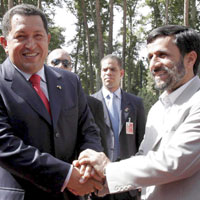Chavez visits Tehran

As Iran and Venezuela unite to resist U.S. policies and suggest other nations to do the same, President Hugo Chaves made his fourth trip to Iran in two years on Monday, according to state media.
Chavez, who arrived in Tehran from Saudi Arabia where he attended the weekend's OPEC summit, is expected to discuss various political and economic issues with his Iranian counterpart, Mahmoud Ahmadinejad, the official Islamic Republic News Agency reported.
Chavez was accompanied by a string of top Venezuelan officials for the hours-long visit, including the foreign, industry, oil and communication ministers, as well as the mayor of Caracas, the country's capital.
Ahmadinejad also attended the Organization of Petroleum Exporting Countries summit in Riyadh.
During the gathering, the two firebrand leaders echoed one another, blaming U.S. President George W. Bush's policies for the decline of the dollar and its negative effect on other countries, and challenging Saudi Arabia's reluctance to mention weak dollar concerns in the summit's final declaration.
Ahmadinejad claimed OPEC's member countries want to convert their cash reserves into a currency other than the depreciating U.S. dollar, which he called a "worthless piece of paper."
Chavez said the dollar was in free-fall and that its "empire" must end, and proposed trading oil in a basket of currencies excluding the dollar.
But the two were unable to generate support from enough in the 13-member cartel - many of whom, including Saudi Arabia, are staunch U.S. allies.
Tehran is in a bitter standoff with Washington over its nuclear program, which the U.S. fears is a cover for a weapons program but which Iran insists is peaceful.
Meanwhile, the U.S. accuses Chavez of being a threat to stability in Latin America, while the Venezuelan leader is constantly criticizing U.S. "imperialism" under Bush. Chavez has also defended Iran's nuclear ambitions, dismissing Washington's concerns that Tehran is secretly trying to develop atomic weapons.
Iran's foreign ministry spokesman, Mohammad Ali Hosseini, said Sunday the two leaders would sign economic deals and memorandums of understanding in economic fields, and an agreement on small and medium enterprises.
In July, the two countries broke ground to start building a jointly owned petrochemical complex in Iran, with 51 percent of it in Iranian ownership and 49 percent to be owned by Venezuela. The two also began construction of a second petrochemical complex in Venezuela, at a total combined cost of US$1.4 billion (EUR956 million). No details on the ventures have been disclosed.
The two nations believe their petrochemical partnership will help Iran access markets in Latin America and Venezuela would get access to energy markets in Asia, especially India.
During Chavez's previous visit in July, the two countries signed some 20 economic and trade agreements. Since 2001, they have signed over 180 trade agreements, worth more than US$20 billion (EUR15 billion) in potential investment, according to IRNA.
Iran has partnered with Venezuela on several industrial projects in the South American nation, including the production of cars, tractors and plastic goods.
Subscribe to Pravda.Ru Telegram channel, Facebook, RSS!


